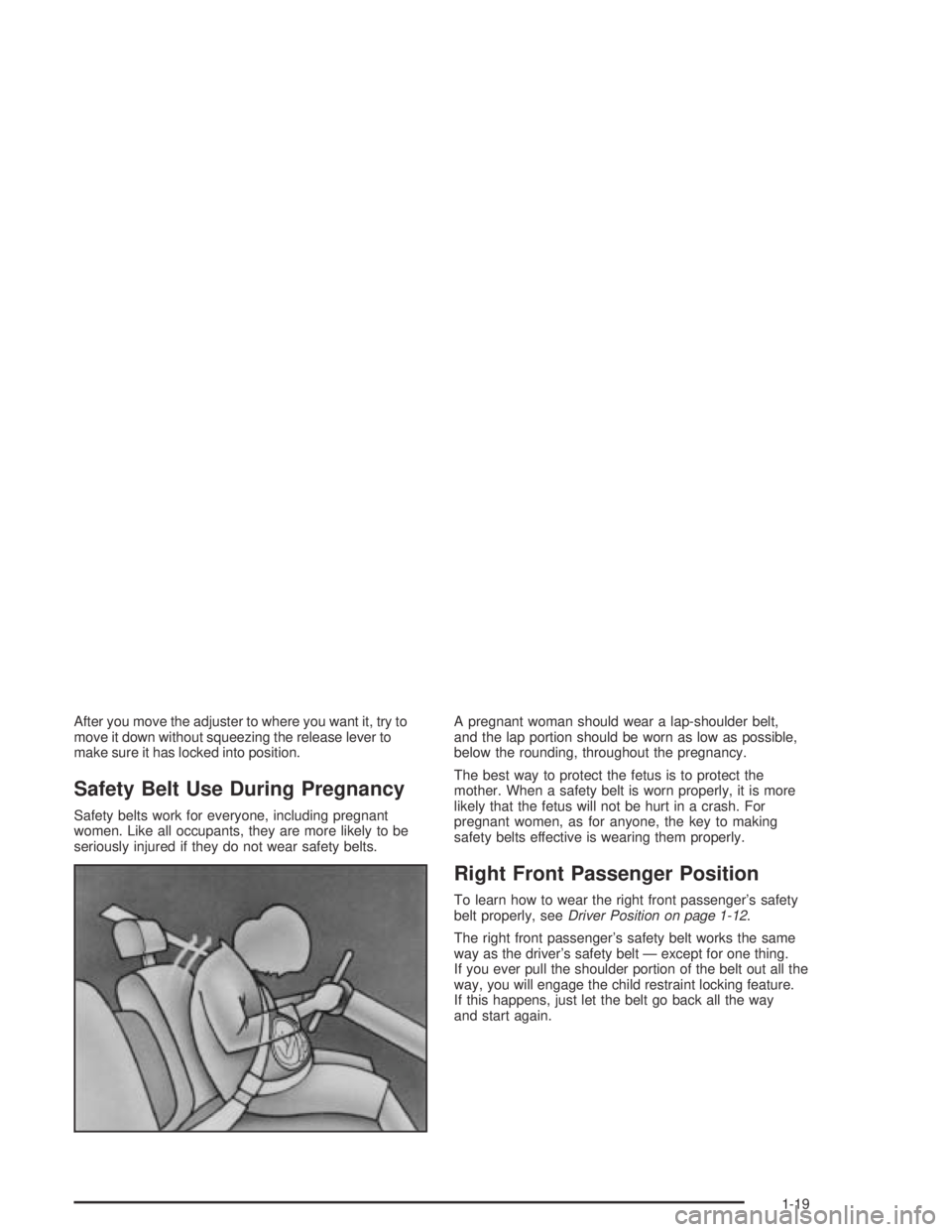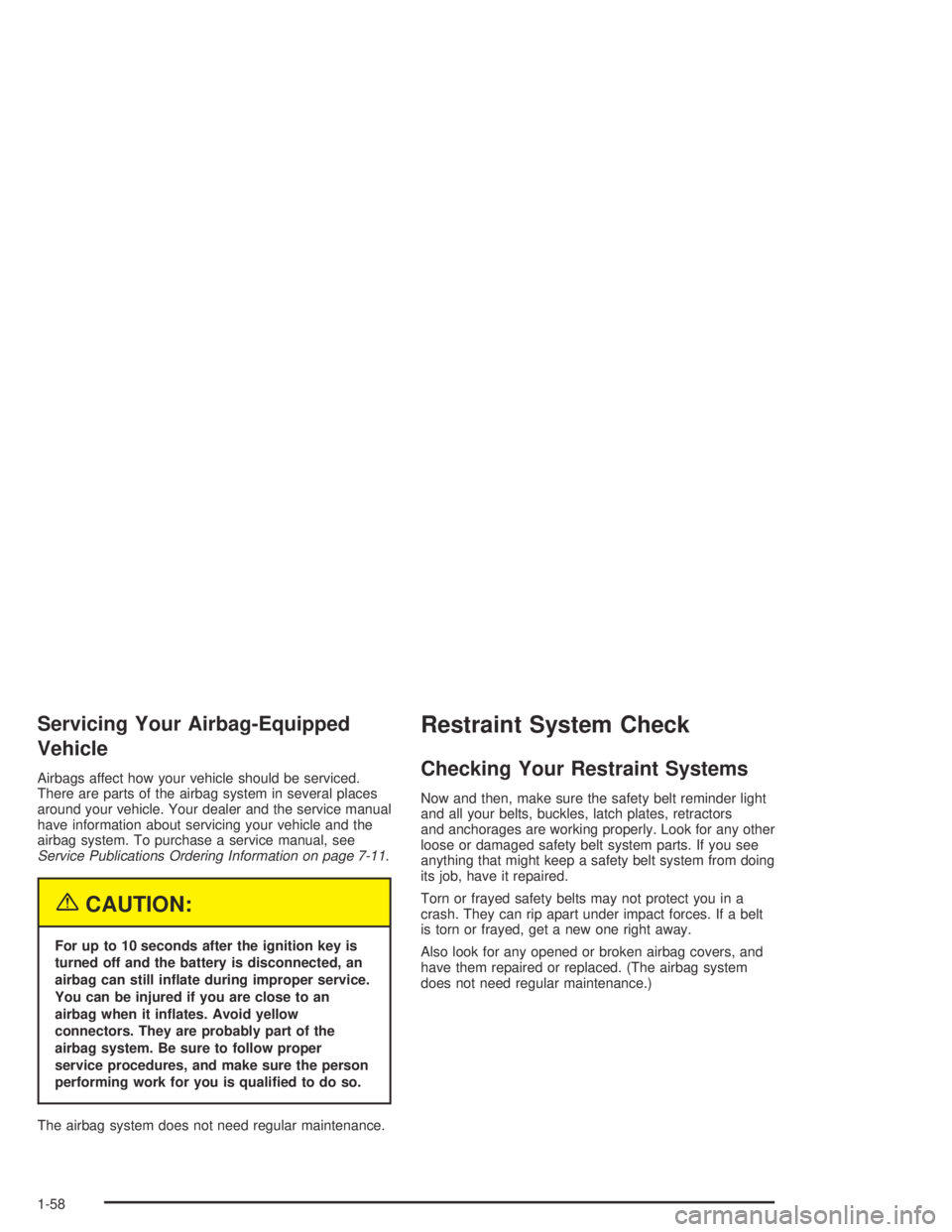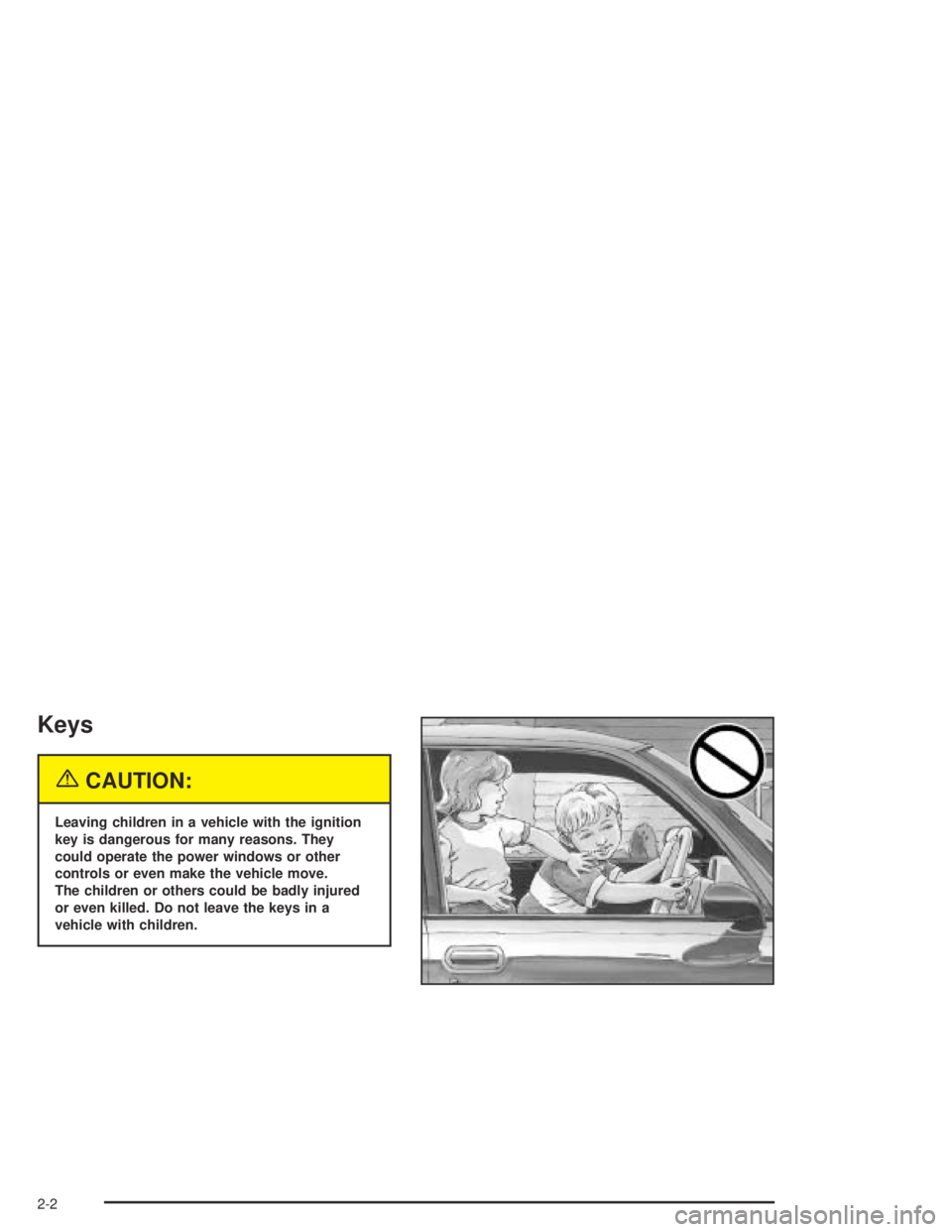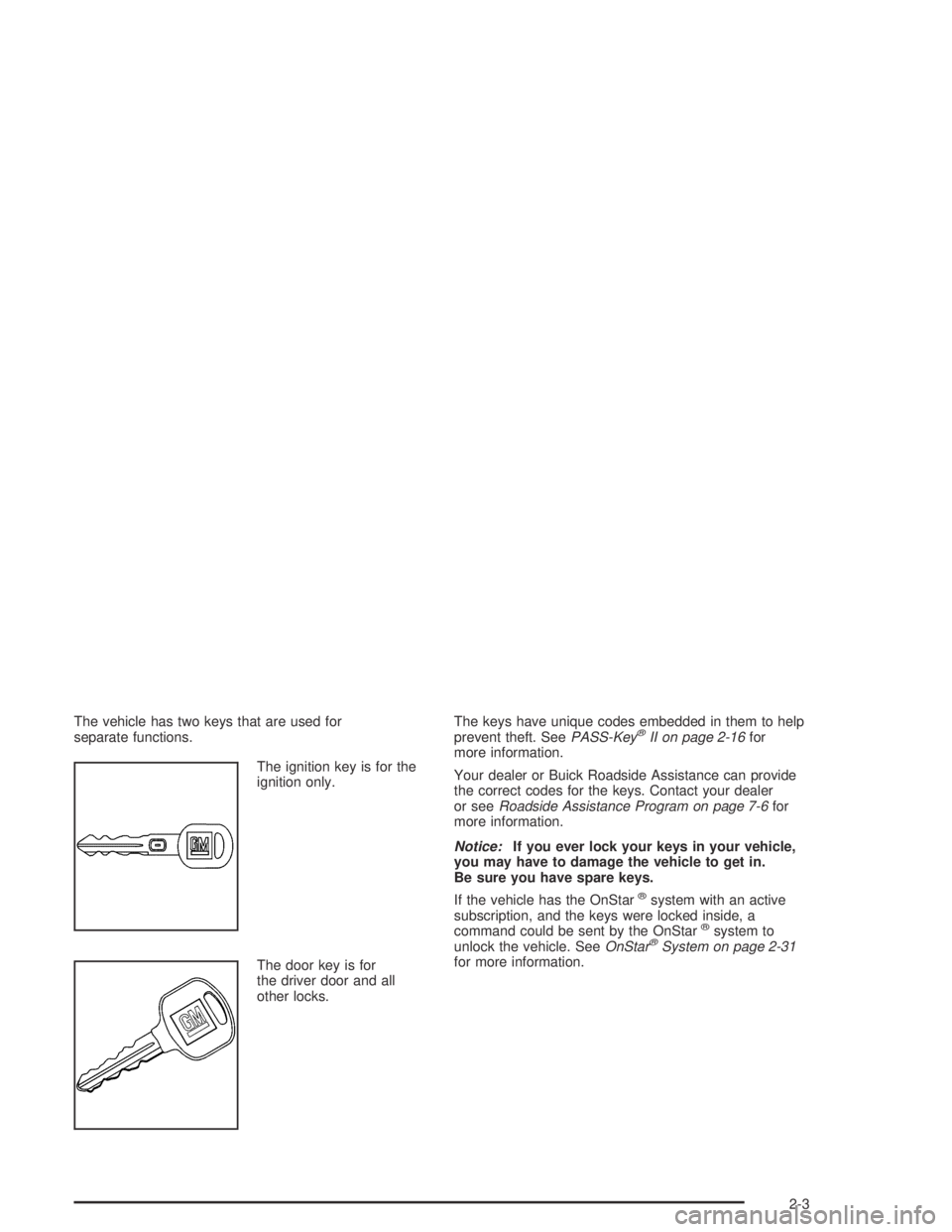2005 BUICK CENTURY key
[x] Cancel search: keyPage 1 of 348

Seats and Restraint Systems........................... 1-1
Front Seats
............................................... 1-2
Rear Seats
............................................... 1-6
Safety Belts
.............................................. 1-6
Child Restraints
.......................................1-27
Airbag System
.........................................1-49
Restraint System Check
............................1-58
Features and Controls..................................... 2-1
Keys
........................................................ 2-2
Doors and Locks
......................................2-10
Windows
.................................................2-14
Theft-Deterrent Systems
............................2-16
Starting and Operating Your Vehicle
...........2-17
Mirrors
....................................................2-29
OnStar
®System
......................................2-31
Storage Areas
.........................................2-33
Instrument Panel............................................. 3-1
Instrument Panel Overview
.......................... 3-4
Climate Controls
......................................3-18
Warning Lights, Gages, and Indicators
........3-28
Audio System(s)
.......................................3-44Driving Your Vehicle....................................... 4-1
Your Driving, the Road, and Your Vehicle
........ 4-2
Towing
...................................................4-36
Service and Appearance Care.......................... 5-1
Service
..................................................... 5-3
Fuel
......................................................... 5-5
Checking Things Under the Hood
...............5-10
Headlamp Aiming
.....................................5-45
Bulb Replacement
....................................5-47
Windshield Wiper Blade Replacement
.........5-52
Tires
......................................................5-53
Appearance Care
.....................................5-82
Vehicle Identi�cation
.................................5-90
Electrical System
......................................5-90
Capacities and Speci�cations
.....................5-96
Maintenance Schedule..................................... 6-1
Maintenance Schedule
................................ 6-2
Customer Assistance and Information.............. 7-1
Customer Assistance and Information
........... 7-2
Reporting Safety Defects
...........................7-10
Index.................................................................1
2005 Buick Century Owner ManualM
Page 25 of 348

After you move the adjuster to where you want it, try to
move it down without squeezing the release lever to
make sure it has locked into position.
Safety Belt Use During Pregnancy
Safety belts work for everyone, including pregnant
women. Like all occupants, they are more likely to be
seriously injured if they do not wear safety belts.A pregnant woman should wear a lap-shoulder belt,
and the lap portion should be worn as low as possible,
below the rounding, throughout the pregnancy.
The best way to protect the fetus is to protect the
mother. When a safety belt is worn properly, it is more
likely that the fetus will not be hurt in a crash. For
pregnant women, as for anyone, the key to making
safety belts effective is wearing them properly.
Right Front Passenger Position
To learn how to wear the right front passenger’s safety
belt properly, seeDriver Position on page 1-12.
The right front passenger’s safety belt works the same
way as the driver’s safety belt — except for one thing.
If you ever pull the shoulder portion of the belt out all the
way, you will engage the child restraint locking feature.
If this happens, just let the belt go back all the way
and start again.
1-19
Page 64 of 348

Servicing Your Airbag-Equipped
Vehicle
Airbags affect how your vehicle should be serviced.
There are parts of the airbag system in several places
around your vehicle. Your dealer and the service manual
have information about servicing your vehicle and the
airbag system. To purchase a service manual, see
Service Publications Ordering Information on page 7-11.
{CAUTION:
For up to 10 seconds after the ignition key is
turned off and the battery is disconnected, an
airbag can still in�ate during improper service.
You can be injured if you are close to an
airbag when it in�ates. Avoid yellow
connectors. They are probably part of the
airbag system. Be sure to follow proper
service procedures, and make sure the person
performing work for you is quali�ed to do so.
The airbag system does not need regular maintenance.
Restraint System Check
Checking Your Restraint Systems
Now and then, make sure the safety belt reminder light
and all your belts, buckles, latch plates, retractors
and anchorages are working properly. Look for any other
loose or damaged safety belt system parts. If you see
anything that might keep a safety belt system from doing
its job, have it repaired.
Torn or frayed safety belts may not protect you in a
crash. They can rip apart under impact forces. If a belt
is torn or frayed, get a new one right away.
Also look for any opened or broken airbag covers, and
have them repaired or replaced. (The airbag system
does not need regular maintenance.)
1-58
Page 67 of 348

Keys...............................................................2-2
Remote Keyless Entry System.........................2-4
Remote Keyless Entry System Operation...........2-5
Doors and Locks............................................2-10
Door Locks..................................................2-10
Power Door Locks........................................2-11
Programmable Automatic Door Locks..............2-11
Lockout Protection........................................2-12
Leaving Your Vehicle....................................2-12
Trunk..........................................................2-12
Windows........................................................2-14
Power Windows............................................2-15
Sun Visors...................................................2-15
Theft-Deterrent Systems..................................2-16
PASS-Key
®II ...............................................2-16
Starting and Operating Your Vehicle................2-17
New Vehicle Break-In....................................2-17
Ignition Positions..........................................2-18
Retained Accessory Power (RAP)...................2-19Starting Your Engine.....................................2-19
Engine Coolant Heater..................................2-20
Automatic Transaxle Operation.......................2-21
Parking Brake..............................................2-24
Shifting Into Park (P).....................................2-25
Shifting Out of Park (P).................................2-26
Parking Over Things That Burn.......................2-27
Engine Exhaust............................................2-27
Running Your Engine While You Are Parked.......2-28
Mirrors...........................................................2-29
Manual Rearview Mirror.................................2-29
Manual Rearview Mirror with OnStar
®..............2-29
Outside Power Mirrors...................................2-30
Outside Convex Mirror...................................2-30
OnStar
®System.............................................2-31
Storage Areas................................................2-33
Glove Box...................................................2-33
Front Storage Area.......................................2-33
Convenience Net..........................................2-33
Section 2 Features and Controls
2-1
Page 68 of 348

Keys
{CAUTION:
Leaving children in a vehicle with the ignition
key is dangerous for many reasons. They
could operate the power windows or other
controls or even make the vehicle move.
The children or others could be badly injured
or even killed. Do not leave the keys in a
vehicle with children.
2-2
Page 69 of 348

The vehicle has two keys that are used for
separate functions.
The ignition key is for the
ignition only.
The door key is for
the driver door and all
other locks.The keys have unique codes embedded in them to help
prevent theft. SeePASS-Key®II on page 2-16for
more information.
Your dealer or Buick Roadside Assistance can provide
the correct codes for the keys. Contact your dealer
or seeRoadside Assistance Program on page 7-6for
more information.
Notice:If you ever lock your keys in your vehicle,
you may have to damage the vehicle to get in.
Be sure you have spare keys.
If the vehicle has the OnStar
®system with an active
subscription, and the keys were locked inside, a
command could be sent by the OnStar
®system to
unlock the vehicle. SeeOnStar®System on page 2-31
for more information.
2-3
Page 70 of 348

Remote Keyless Entry System
Your keyless entry system operates on a radio
frequency subject to Federal Communications
Commission (FCC) Rules and with Industry Canada.
This device complies with Part 15 of the FCC Rules.
Operation is subject to the following two conditions:
1. This device may not cause interference, and
2. This device must accept any interference received,
including interference that may cause undesired
operation of the device.
This device complies with RSS-210 of Industry Canada.
Operation is subject to the following two conditions:
1. This device may not cause interference, and
2. This device must accept any interference received,
including interference that may cause undesired
operation of the device.
Changes or modi�cations to this system by other than
an authorized service facility could void authorization to
use this equipment.At times you may notice a decrease in range. This is
normal for any remote keyless entry system. If the
transmitter does not work or if you have to stand closer
to your vehicle for the transmitter to work, try this:
Check the distance. You may be too far from your
vehicle. You may need to stand closer during
rainy or snowy weather.
Check the location. Other vehicles or objects may
be blocking the signal. Take a few steps to the
left or right, hold the transmitter higher, and
try again.
Check to determine if battery replacement is
necessary. See “Battery Replacement” under
Remote Keyless Entry System Operation on
page 2-5.
If you are still having trouble, see your dealer or a
quali�ed technician for service.
2-4
Page 71 of 348

Remote Keyless Entry
System Operation
The remote keyless entry transmitter enables the
vehicle’s doors to be locked and unlocked, or the trunk
lid to be released, from about 3 feet (1 m) and up to
30 feet (9 m) away.
LOCK:Press the LOCK
button to lock all the doors.
UNLOCK:Press the UNLOCK button to unlock the
driver door and turn on the interior lamps. See
“Illumination on Remote Activation” later in this section
for more details. Press UNLOCK again to unlock
the passenger doors.
F(Trunk Release):To release the trunk lid, press
this button. The trunk will only unlock if the transaxle
is in PARK (P).
L(Remote Alarm):Press this button to activate an
alarm. The ignition must be in OFF or ACCESSORY for
the remote alarm to work. When the remote alarm
button is pressed, the headlamps will �ash, the horn will
sound repeatedly, and the interior lamps will turn on.
The alarms will turn off when one of the following occurs:
The remote alarm button on the remote keyless
entry transmitter is pressed a second time.
The ignition is moved to RUN.
The alarms have been on for about two minutes.
Security Feedback
The remote keyless entry transmitter can be
programmed so that when the LOCK or UNLOCK
button is pressed, the vehicle gives visual or audible
feedback con�rmation. Each lock or unlock command
veri�cation must be programmed individually. The
ignition must be OFF for this feature to work.
Disconnecting the vehicle’s battery for up to a year will
not affect the programmed mode.
2-5